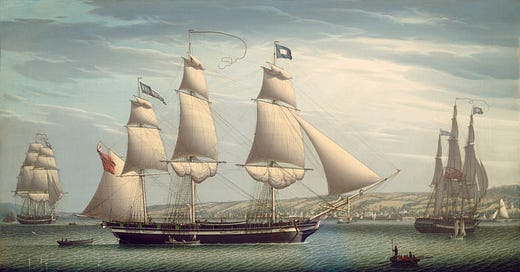From Sea to Shining Sea...And everything in Between
Thoughts on Karin Wulf's essay "Vast Early America," (2019)
Karin Wulf, “Vast Early America: Three Simple Words for a Complex Reality,” Humanities (Winter 2019), here.

Twitter (X), before Mr. Musk purchased the platform and sent waves of academics for Mastodon, Bluesky, and other left-leaning social media platforms, was quite a space of academic discussion, ranting, and conversation. One such conversation grew out of Karin Wulf’s 2016 hashtag #VastEarlyAmerica. The trend exploded among Early Americanists (historians of the pre-19th century Americas) as more and more historians began considering the concept of Vast Early America. By 2019, when she published her Humanities essay, “Vast Early America: Three Simple Words for a Complex Reality,” the topic had moved from the realms of Twitter and had become a growing trend in the field. But does this Twitter grown concept have the staying power that other terms, such as “Atlantic world” or “Early Republic” have had in the historical profession?
Karin Wulf is currently the Director and Librarian of the John Carter Brown Library and a Professor of history at Brown University in Rhode Island. Previously, she was the director of the Omohundro Institute of Early American History & Culture, one of the most prestigious historical institutions in the United States. In her first essay on the concept of Vast Early America, she defined the term loosely as an “expansive view” of Early American history, one which is broad enough to incorporate the worlds of what are today the Caribbean, Latin America, as well as the worlds of Afro and Indigenous peoples. In essence, Wulf suggested that it was time to push back on the boundaries of traditional national histories and instead examine the flow of people and goods across the borders of various empires, kingdoms, and indigenous territories. In sum, Vast Early America was about interconnection between the peoples who made up the Americas in the pre-19th century era.
There is much to like about this concept, though admittedly I was a little skeptical when first presented with the idea. Humans rarely confine themselves within stable national boundaries and the Atlantic world quickly became entangled with an existing native world that was vibrant and complex. In Wulf’s essay, finding connection and how peoples pushed and lashed out at each other are key in understanding the formation of the United States as we know it today. This in turn leads Wulf and other scholars within the Vast Early America camp to place heavy emphasis on slavery, trade, and empire, which often interconnected the spaces of the American continents. She argues that by approaching history in this manner, “
American national history that does not see the depth and breadth of Native America across its historical landscape, that does not see slavery lying at the bedrock of the American experience, that overlooks the centuries-long significance of Mexican-American heritage cannot appreciate the great democratic ambitions the United States has articulated, defended, and pursued for almost two and a half centuries.1
In sum, in order to understand the United States, one must look to where cultures collided and meshed, where conflict and violence interwove with imperialism and racism.
The concept of interconnection is important, particularly in showing the way in which peoples connected, interacted, and developed communities across the Americas. Furthermore, I do think that fixed national or imperial boundaries are less important when it comes to human relations.2 However, the Vast Early America movement also misses the local by prioritizing the interconnectedness of the Americas. Furthermore, did the historical actors we study actually conceive of the world this way? Is this simply an ahistorical invention imposed as we look for transnational narratives? Is there ever a limit to how vast is early America?
It will be interesting to see if this trend of #VastEarlyAmerica continues. While I think there has been an overemphasis on slavery and empire in this framework, these topics are still very important. Ultimately, I think the durability of this concept will depend on its ability to connect with, rather than criticize, existing scholarship. Without working with those who do more “national” histories, scholars of Vast Early America will not be able to acquire the depth that comes from focusing on a specific region or area and will remain a niche topic.
Robert Swanson
Wulf, “Vast Early America”
I would suggest that this is in part due to our nature as spirit children of God.



